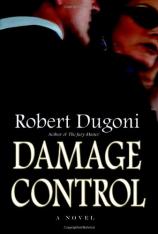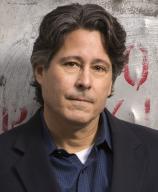Interview: February 16, 2007
February 16, 2007
In this interview with Bookreporter.com's Joe Hartlaub, Robert Dugoni explains why his second novel, DAMAGE CONTROL, is much more personal and emotional than his debut work of fiction, THE JURY MASTER, and describes some of the strong women in his life upon whom his characters are based. He also discusses his interest in architecture and shares details about future books featuring protagonists David Sloane, Tom Molia and Dana Hill.
Bookreporter.com: DAMAGE CONTROL is a very different book from THE JURY MASTER. In many ways, it's a much more personal and emotional book. Was there an event or events that led to your writing DAMAGE CONTROL?
Robert Dugoni: I wanted to write a book with a strong female protagonist. First, I wanted the challenge. Second, I've been influenced by a lot of strong women in my life. My mother is a self-professed tough old Irish lady, and my sisters are all professionals. I grew up admiring and respecting them. In the law profession, you also encounter a lot of competent, tough women. So, I wanted a protagonist who reflected all of those things. And of course, as I mentioned in the acknowledgment of the book, my mother is a breast cancer survivor and I remember vividly the day I received that call from my sister to tell me that my mother had cancer. It was a frightening prospect to think that she could die. And yet, she was tough as nails. She would go for her chemo on a Friday, then get up Monday and go to work. She didn't get to stop being a professional, a wife, a mother --- all of those things. Also, recently, my wife's cousin died of breast cancer. She was just 40, with two young sons. She was beautiful and successful. It was so sad. I felt so bad for my cousin and his sons, and can't imagine the pain they suffered. I wanted Dana to have to battle through that while coping with her brother's death.
BRC: Was your writing process during the course of your work on DAMAGE CONTROL substantially different from the way in which you worked on THE JURY MASTER?
RD: Not really. I maintain full days, and try to write or edit from 7 or 8 in the morning until 4-5 in the afternoon. When I'm not writing, I'm researching. I get antsy if I'm not doing something. I also don't outline so much as I script using basic story structure. Outlining for me creates anxiety.
BRC: You demonstrate in DAMAGE CONTROL that you have the ability to create convincing, believable female characters, particularly Dana Hill and Carmen Dupree. It is somewhat difficult for men to jump the gender fence, so to speak, when creating a female character, but you show remarkable insight into the female psyche. Did you have assistance from any of the women in your life, either in the creation of Dana Hill or in her characterization? Or is there another reason why you think you write women so well?
RD: As I said above, I've always been surrounded by strong, capable women. My sisters helped to raise me and I have tremendous respect for them, as well as my mother. My wife is also a strong woman. She does everything well. I tried to tap into all of those experiences. I was with my sisters through some difficult times, and I remembered those experiences and some of the pain it caused them. As a writer, my job is to be perceptive to the people and the things around me. I try to do that, and I try to write honestly.
BRC: Two of the most important characters in DAMAGE CONTROL, William Welles and Frank Pilgrim, appear only for very brief periods, yet their actions are pivotal to everything that ultimately occurs. Welles, in particular, is perhaps the most interesting character in the book. Did you deliberately keep their appearances brief in order to contrast the influence they had over events in DAMAGE CONTROL? What else can you share with readers about them and their character development.
RD: Frank Pilgrim was a great way to introduce intrigue right at the beginning of the book. I love the way he developed. He is everybody's grandfather, and is so innocent in all that ultimately transpires. I saw him as Bert Lancaster in Field of Dreams. Welles is a bit more mystical. I wanted the reader to be curious about him, but didn't want to overdo his role in the story. He is important, but really, he is important to the extent that Dana can find him and find out what she needs to know. In a way, he becomes a mentor figure to her, letting her know that she can't help her brother until she learns to help herself. He is a bit like her Yoda.
BRC: Jewelry design and architecture are two disciplines that figure prominently in DAMAGE CONTROL. What interest have you had in those disciplines that ultimately led you to --- at least in part --- base DAMAGE CONTROL on them?
RD: Honestly, I'm not much into jewelry. I don't wear any. I saw the earrings that are prominent in the book in a jewelry store on Grand Cayman, and I thought they were amazing in appearance (and price as well). I always remembered them. I'm not sure I ever thought they'd be in a book. I am a bit more fascinated with architecture. I put myself through school doing construction, and I have a lot of knowledge regarding building techniques. In particular, I appreciate the designs of homes --- the things that make them unique. Both of the homes that figure prominently in DAMAGE CONTROL actually exist.
BRC: On a related note, I was particularly intrigued with the design of Michael Logan's home in DAMAGE CONTROL. Is your description of Logan's home based upon an existing residence, or rather description of your dream home, unrealized or otherwise?
RD: See above. Yes, it is in part based upon an actual home in which the builder stripped existing trees of their bark and polished them, etc., to use in the original design. It looked like a tree house inside, like something from SWISS FAMILY ROBINSON. It wouldn't be my dream home, but it was incredible to see.
BRC: Your first book was a nonfiction work that you co-wrote. Do you have any inclination or plans to write another nonfiction work?
RD: I'm always looking for a good true story. I love to do research and I love to try to find evidence to support each fact. It's my journalist and lawyer background. It makes it fun, like putting together a puzzle. I'm going to talk to a detective about a potential story. They aren't easy to find. You need the right mix between a story that is interesting and has had some publicity, but wasn't overdone in the media. Also, nonfiction usually needs to be more than a good story --- it has to touch upon a larger, interesting issue that makes it universal in appeal, or at least appeal to a wider audience.
BRC: You were a practicing attorney for many years before turning to writing. What made you want to become a writer? What surprises and disappointments, if any, have you experienced since turning to writing as an occupation?
RD: I'm actually a writer turned lawyer turned writer. Journalism was my major in college, and I worked briefly as a reporter before I attended law school. But writing has always been my passion and writing novels always my dream. I love to create characters and place them in new worlds, watching them grow and develop and come alive. It is an incredible feeling of control that you don't always have over your real world. On days I write, I can't wait to get to the keyboard.
But writing can be a profession of rejection, and that's tough. Even when you finally get published, some readers can be just brutal. You have to have thick skin and realize that it's only one person's opinion. I've been fortunate so far. The vast majority of emails I get are from people who love my work, and that is equally gratifying. Those emails make my day, and I realize that all of those hours spent alone trying to craft characters and plot paid off; that I was able to take someone out of their ordinary world and into a fantasy world --- if only for a little while --- and they are grateful for it.
BRC: I have read elsewhere that you are one of 10 children and that your siblings have followed a wide variety of career paths. Are any of your brothers and sisters writers, aspiring or otherwise? Are they all readers? Who instilled in you your love of reading and writing?
RD: My brothers and sisters are mostly more scientific and math oriented, like my father, who was an independent pharmacist. They weren't much into writing, or reading, for that matter. My mother was an English major and school teacher until she started having children, then went back and became a CPA. She's had her own business for 30 years, but has always had a love for writing and for reading. She gave me the desire and the encouragement to pursue my writing. She also remains the person I ask most often, "What good books have you read lately?"
BRC: On a related note, are there authors of any genre who have influenced your work?
RD: I have always admired Stephen King's work for his ability to tell stories and to use all of his senses on every page. The guy is in his own league. I also read a lot of Stephen Hunter, Brian Haig, Michael Connelly, Nelson DeMille, Robert Crais, Harlan Coben, John Lescroart, and two very talented Canadian writers: Mike Harris and John McFetridge.
BRC: What are you working on now? Do you plans to continue to write books that stand on their own, or do you have any plans for a series?
RD: I'm working on a novel that will bring back David Sloane and Charles Jenkins from THE JURY MASTER, and I'm contemplating novel ideas to bring back Detective Tom Molia from THE JURY MASTER and Dana Hill from DAMAGE CONTROL. My intent was to always do stand-alone books and I'd like to continue to do that, but where the opportunity arises, I will bring back characters from past novels. So far, readers have wanted more, which is always a good thing.




